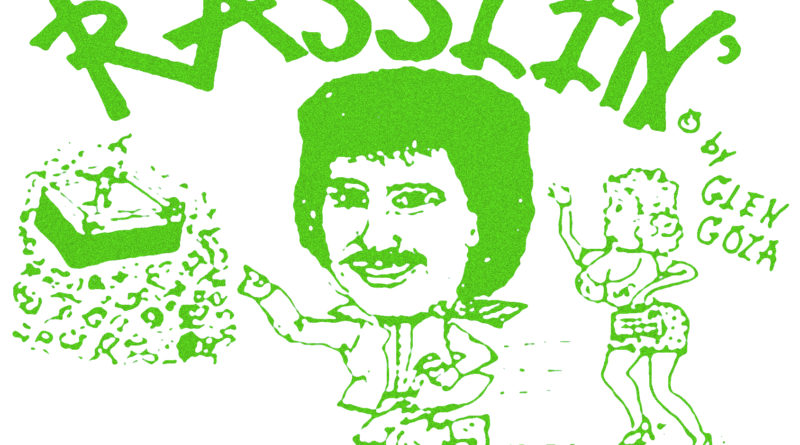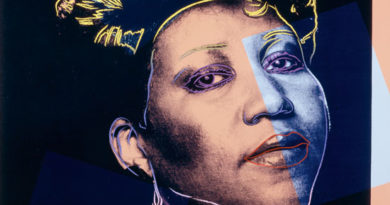Glen Goza, The Von Erichs and R-A-S-S-L-I-N’
A look back at the songwriter who helped Texas wrestling fans heal from the unexpected death of a beloved wrestling superstar in 1984

One of the best retro clips from the 1980s given new life by wrestling podcasts isn’t of an historic match or a fiery promo. Instead, footage made infamous by 6:05 The Superpodcast, The Lapsed Fan and others shows a man named Glen Goza performing an absurd song called “Rasslin” during a World Class Championship Wrestling (WCCW) event at the Cotton Bowl.
Like a lot of excavated gems from grainy VHS tapes, it’s so bad that it’s good. Considering Goza’s history with novelty songs and light-hearted local radio, it’s no stretch to think he’d be sharing a few self-depreciating laughs online with his fellow wrestling fans were it not for his untimely death in 2000.
In recent years, WWE, ESPN and Viceland have told overlapping stories about WCCW and its hometown heroes the Von Erich’s, a family of wrestlers struck by one real-life tragedy after another. So, there’s no need to go in-depth here about Fritz Von Erich and his five wrestling sons: Kevin, David, Kerry, Mike and Chris.
VIDEO: The Von Erichs vs. The Fabulous Freebirds, May 1984
Instead, let’s explore the scarce yet interesting details about Goza, a former Nashville songwriter who, with mixed results, provided a soundtrack for one of the hottest American wrestling promotions before Hulkamania reached its peak in New York.
Home of the Big “D” Jamboree

The “Rasslin” celebrated by Goza didn’t usually happen at the Cotton Bowl, although a hot show did get planned most years around the State Fair of Texas. Instead, there were hot shows, in more than one sense, in a sweltering metal barn called The Sportatorium.
Viewers of the before-mentioned Von Erich documentaries may recognize a name long emblazoned outside the Sportatorium: Ed McLemore. He’s a Dallas businessman who’d worked his way up from a food vendor during the matches to the main promoter for two cultural happenings of the 1950s: Dallas wrestling and the Big “D” Jamboree.
The Big “D” Jamboree was a “barn dance” style live radio broadcast in the same mold as the Grand Ole Opry. While Nashville and other country music hotbeds felt threatened by the rise of rockabilly, McLemore wasted no time opening his stage to Johnny Cash, Elvis Presley, Carl Perkins, Wanda Jackson and others. McLemore wasn’t image-conscious: he was money-conscious. And he must’ve seen money in countrified rock, considering he briefly managed Gene Vincent.
Not only did country and early rock legends play the same building that hosted Dallas wrestling. Due to space limitations in the circular arena, a rope-less ring doubled as a stage, meaning Goza wasn’t the first country crooner to perform in a squared circle later graced by the Von Erich sons. For example, Scotty Moore’s website includes surreal photographs of Presley performing in McLemore’s multi-use ring.
“Heaven Needed a Champion”

In 1984, 25-year-old David Von Erich, a top contender for Ric Flair’s NWA world heavyweight title, died unexpectedly in Japan from a stomach ailment. When the son of Dallas radio personality Norman Johnson told his dad the news, the youngster figured that God must’ve needed a champion for Heaven. Johnson wasted no time pitching a song about child-life faith to Goza. The pair quickly wrote “Heaven Needed a Champion” and booked the first available time slot at the Arkansas studio of Mickey Moody, the engineer behind Freddie Fender’s hits.
“Heaven Needed a Champion” got released in time for the David Von Erich Memorial Parade of Champions, a May show in Texas Stadium. To help fans cope with the loss of David, young Jill Floyd, the sister of Honeysuckle Rose actor and future Toby Keith bandmate Joey Floyd, sang Goza’s new single during the card.
AUDIO: “Heaven Needed A Champion”
Both the Goza-sung recording and Floyd’s live rendition of “Heaven Needed a Champion” suit well-intentioned lyrics meant to comfort a grieving fan base. Its B-side, a partly spoken-word tribute titled “David and The Poet,” makes Goza sound like an accidental Allen Ginsberg impostor and falls well short of capturing its flipside’s undeniable charm.
Meet Glen Goza

It’s unfair to characterize Goza simply for his wrestling-themed material. He cut some rockabilly and country sides over the prior 20-plus years, most notably a “Monster Mash” clone for the Wand label titled “The Box.” He also worked as a novelty songwriter for George “Goober” Lindsey, and he penned more serious material recorded by country star Norma Jean.
Goza came from a musical family, with brother Bob working as an instrument repairman for years and a second sibling, Frank, trying his own hand at country songwriting. Sister Pat Goza-White did okay for herself, as well, marrying bluegrass great Buck White. She’s also got daughters named Cheryl and Sharon and a son-in-law named Ricky (Skaggs, that is). While Glen sang of in-ring exploits from the former home of the Big “D” Jamboree, some of his kin folks performed regularly on the Grand Ole Opry stage.
Goza later worked on other songs for the Von Erich’s. These include the quirky “Rasslin,” young Chris Von Erich’s harmlessly fun “My Dad Can Whip Your Dad” and an either lost or non-existent recording of Fritz singing the merits of his feared finishing hold, the iron claw.
Indeed, Goza’s silly songs helped fans heal in a wrestling territory that historically overlapped with country music, first with a tribute to David (one of four Von Erichs to die in a nine-year span) and then with “Rasslin.” And his time for recognition as an artist beyond the novelty is long overdue.
VIDEO: Glen Goza sings “Rasslin'” at the Cotton Bowl




